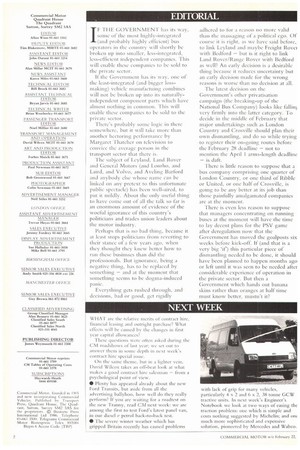I F THE GOVERNMENT has its way, some of the most
Page 2

If you've noticed an error in this article please click here to report it so we can fix it.
highly-integrated (and probably highly efficient) bus operators in the country will shortly be broken up into smaller, less-integrated, less-efficient independent companies. This will enable these companies to be sold to the private sector.
If the Government has its way, one of the least-integrated (and bigger lossmaking) vehicle manufacming combines will not be broken up into its naturallyindependent component parts which have almost nothing in common. This will enable these companies to be sold to the private sector.
There's probably sonic logic in there somewhere, but it will take more than another hectoring performance by Margaret Thatcher on television to convice the average person in the transport sector that there is.
The subject of Leyland, Land Rover and General Motors (and Lonrho, and Laird, and Volvo, and Aveling Barford and anybody else whose name can be linked on any pretext to this unfortunate public spectacle) has been well-aired, to put it mildly. About the only useful thing to have come out of all the talk so far is an enormous amount of evidence of the woeful ignorance of this country's politicians and trades union leaders about the motor industry.
Perhaps that is no bad thing, because it at least stops politicians ti-on reverting to their stance of a few years ago, when they thought they knew better how to run these businsses than did the professionals. But ignorance, being a negative thing, has to be replaced by something — and at the moment that something seems to be dogma-induced panic.
Everything gets rushed through, and decisions, bad or good, get rigidly adhered to for a reason no more valid than the massaging of a political ego. Of course it is right, as we have said before, to link Leyland and maybe Freight Rover with Bedford — but is it right to link Land Rover/Range Rover with Bedford as well? An early decision is a desirable thing because it reduces uncertainty but an early decision made tbr die wrong reasons is worse than no decision at all.
The latest decision on the Government's other privatisation campaign (the breaking-up of the National Bus Company) looks like fallin very firmly into the latter category. To decide in the middle of February that major undertakings such as London Country and Crosville should plan their own dismantling, and do so while trying to register their on-going routes before the February 28 deadline — not to mention the April 1 arms-length deadline — is daft.
There is little reason to suppose that a bus company comprising one quarter of London Country, or one third of Ribble or United, or one half of Crosville, is going to be any better at its job than those painfully amalgamated companies are at the moment.
There is even less reason to suppose that managers concentrating on running buses at the moment will have the time to lay decent plans for the PSV game after deregulation now that the Government has moved the goalposts six weeks before kick-off. If (and that is a very big 'if') this particular piece of dismantling needed to be done, it should have been planned to happen months ago or left until it was seen to be needed after considerable experience of operation in the private sector. But then a Government which hands out banana skins rather than oranges at half time must know better, mustn't it?
























































